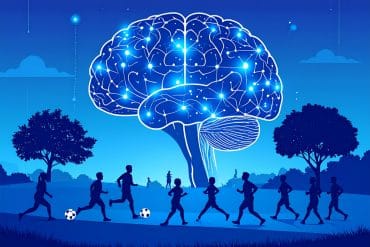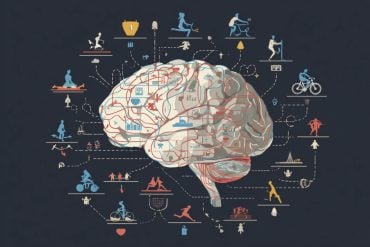Summary: People may underestimate the role of habit in their behaviors, including coffee consumption, researchers say. The automatic triggering of a behavior, such as a person’s morning routine of coffee consumption, versus conscious intent is what makes a behavior a habit.
Source: USC
Did you drink a cup of coffee this morning? If so, was it because you actually felt tired, or did you simply follow a habitual morning routine?
A USC study published this month in Psychological Science found participants underestimated the role of habit in their behaviors—including their coffee consumption.
“People may consume coffee out of habit—for example, you may automatically follow a coffee drinking routine when you wake up or go on your morning commute, regardless of how tired you are,” said study author Asaf Mazar, a doctoral candidate in psychology at the USC Dornsife College of Letters, Arts and Sciences.
That automatic triggering of behavior, versus conscious intentions, is what makes a behavior a habit, explained Mazar.
“Much of what we do every day is habitual, but we are reluctant to acknowledge our habits and instead chalk our behaviors up to our mood and our intentions,” said study author Wendy Wood, USC Provost Professor of psychology and business.
To investigate just how much people underestimate the influence of habits, Mazar and Wood asked study participants what drives their coffee consumption. The respondents said fatigue was about twice as important as habit in prompting their coffee drinking.
Next, the researchers tracked the study participants over the course of one week, recording their coffee drinking and tiredness every two hours. In contrast to the participants’ explanations, habit was just as strong an influence on coffee consumption as feeling tired.
“We found that the participants strongly overestimated the effect of tiredness on their coffee consumption and underestimated the effect of habit,” said Mazar.
Even when participants were offered financial incentives to accurately explain why they were drinking coffee, they more frequently cited fatigue than habit.
Habits influenced behaviors in researchers’ experiments
The researchers also conducted an experiment with online participants who initially recalled a negative, positive or neutral memory.
Next, they then engaged in an exercise in which they repeatedly pressed either a left-hand or right-hand key.
Finally, they were asked if they would like to complete additional trials of the experiment to assist the researchers.
Participants indicated their willingness to help by pressing a highly practiced or less practiced key.
Those who had earlier extensively practiced the “no” response key were more likely to decline the request for help, compared with participants who practiced the “yes” and “no” response keys equally.
While participants were more likely to ascribe their willingness to help to their mood, the results demonstrated the responses had far more to do with the key-pressing habits they adopted during the experiment.
“The experiment provided causal evidence that people’s explanations for their behavior favor inner states over habits, even when that behavior is driven by habit,” said Wood.
Why we should pay more attention to our good and bad habits
The study authors say that the gap between the actual and perceived role of habits in our lives explains why Americans have such a hard time changing ongoing, repeated behaviors—such as maintaining a steady exercise program and a healthy diet.
Some of this is cultural, they said. When asked to list what stops them from making beneficial lifestyle changes, Americans commonly cite a lack of willpower.

“To effectively change behavior, Americans must acknowledge that much of our behavior is habitual and automatic,” said Mazar. “Habits can keep us repeating unwanted behaviors, but they can also keep us on track in maintaining desirable ones, like working out or recycling.”
Wood and Mazar pointed to climate change as an example of a problem where people across the world are highly motivated to change their behavior to live more sustainable lives. However, “they just don’t know what to do and how to do it repeatedly,” said Wood.
To better understand one piece of the sustainability puzzle, they recently conducted a survey on recycling behaviors.
“Successful recyclers had figured out how to create habits—without having to stress or think much—that made recycling easy and rewarding,” Wood explained. “They put their recycling bins in the kitchen, not in the garage. They displayed signs indicating where to put the trash and how to sort it. They had these hacks.”
It may sound obvious, said Wood, “but it’s not what you know; it’s what you do.”
About this behavioral neuroscience research news
Author: Jenesse Miller
Source: USC
Contact: Jenesse Miller – USC
Image: The image is in the public domain
Original Research: Closed access.
“Illusory Feelings, Elusive Habits: People Overlook Habits in Explanations of Behavior” by Asaf Mazar et al. Psychological Science
Abstract
Illusory Feelings, Elusive Habits: People Overlook Habits in Explanations of Behavior
Habits underlie much of human behavior. However, people may prefer agentic accounts that overlook habits in favor of inner states, such as mood.
We tested this misattribution hypothesis in an online experiment of helping behavior (N = 809 adults) as well as in an ecological momentary assessment (EMA) study of U.S. college students’ everyday coffee drinking (N = 112).
Both studies revealed a substantial gap between perceived and actual drivers of behavior: Habit strength outperformed or matched inner states in predicting behavior, but participants’ explanations of their behavior emphasized inner states.
Participants continued to misattribute habits to inner states when incentivized for accuracy and when explaining other people’s behavior.
We discuss how this misperception could adversely influence self-regulation.







